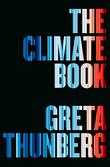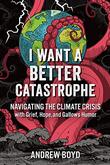As our climate crisis continues to deepen, leading to more frequent and more powerful natural disasters, I find it increasingly difficult to feel optimistic about the future. Indeed, life in the Anthropocene—defined by National Geographic as “the most recent period in Earth’s history when human activity started to have a significant impact on the planet’s climate and ecosystems”—can feel depressing, occasionally even hopeless. Countless books have addressed climate change from nearly every angle imaginable, and most of them are understandably grim. This month brings two new books that, while fair-minded in their assessments of dire circumstances, offer refreshing glimpses of hope and optimism in the face of monumental challenges.
 First, we have the aptly titled The Climate Book (Penguin Press, Feb. 14) by Greta Thunberg, arguably the world’s most recognizable climate activist. Unlike her autobiography, No One Is Too Small To Make a Difference, this book is an expansive gathering of knowledge and insight from some of the leading minds in a variety of relevant disciplines, from science and engineering to philosophy and history. Abundant graphs, charts, and illustrations accompany wise essays by Elizabeth Kolbert, Michael Oppenheimer, Naomi Oreskes, Mike Berners-Lee, Robin Wall Kimmerer, Margaret Atwood, Abrahm Lustgarten, Friederike Otto, and many other important voices. Though they recognize the gravity of our existential threat, as our critic notes in a starred review, “most of the contributors remain optimistic that, with enough public outrage and demands for change, a solution is possible—only if we act immediately.”
First, we have the aptly titled The Climate Book (Penguin Press, Feb. 14) by Greta Thunberg, arguably the world’s most recognizable climate activist. Unlike her autobiography, No One Is Too Small To Make a Difference, this book is an expansive gathering of knowledge and insight from some of the leading minds in a variety of relevant disciplines, from science and engineering to philosophy and history. Abundant graphs, charts, and illustrations accompany wise essays by Elizabeth Kolbert, Michael Oppenheimer, Naomi Oreskes, Mike Berners-Lee, Robin Wall Kimmerer, Margaret Atwood, Abrahm Lustgarten, Friederike Otto, and many other important voices. Though they recognize the gravity of our existential threat, as our critic notes in a starred review, “most of the contributors remain optimistic that, with enough public outrage and demands for change, a solution is possible—only if we act immediately.”
In addition to the comprehensive coverage of all of the issues involved, from oceanic warming to environmental degradation to the erosion of biodiversity, Thunberg’s collection is impressive in its diversity, showcasing a truly global perspective on a problem that must be addressed on a global level. This is truly “vital reading for anyone who cares about the planet.”
 In his latest book, I Want a Better Catastrophe: Navigating the Climate Crisis With Grief, Hope, and Gallows Humor (New Society Publishers, Feb. 14), humorist and longtime activist Andrew Boyd takes a different approach to the subject, allowing readers to ruminate on the crisis without drowning in scientific data. As our critic notes in a starred review, the author “describes himself as a ‘tragic optimist,’ ‘can-do pessimist,’ and ‘compassionate nihilist’ when he considers efforts to reverse or mitigate environmental devastation.” The collection is a nice mix of perspectives from “hopers and doomers,” all of whom address, in one way or another, a central question: Given the daunting nature of this crisis, “what is still worth doing?” From Kimmerer to “eco-Buddhist” Joanna Macy to psychoanalyst Jamey Hecht, who believes that we can “know the worst and still be happy,” the contributors examine the situation in their own unique ways, giving readers much to ponder, whether they choose to wallow in despair, remain relentlessly optimistic, or try to alleviate the depressing facts with dark humor.
In his latest book, I Want a Better Catastrophe: Navigating the Climate Crisis With Grief, Hope, and Gallows Humor (New Society Publishers, Feb. 14), humorist and longtime activist Andrew Boyd takes a different approach to the subject, allowing readers to ruminate on the crisis without drowning in scientific data. As our critic notes in a starred review, the author “describes himself as a ‘tragic optimist,’ ‘can-do pessimist,’ and ‘compassionate nihilist’ when he considers efforts to reverse or mitigate environmental devastation.” The collection is a nice mix of perspectives from “hopers and doomers,” all of whom address, in one way or another, a central question: Given the daunting nature of this crisis, “what is still worth doing?” From Kimmerer to “eco-Buddhist” Joanna Macy to psychoanalyst Jamey Hecht, who believes that we can “know the worst and still be happy,” the contributors examine the situation in their own unique ways, giving readers much to ponder, whether they choose to wallow in despair, remain relentlessly optimistic, or try to alleviate the depressing facts with dark humor.
After pondering, readers can peruse the author’s helpful list of a few dozen organizations in order to get involved. As our review noted, Boyd shows that while “individual actions—recycling, a plant-based diet, biking and walking rather than driving—are not useless…community is crucial for meaningful change.” His book assembles an appealing community of thought that strikes a different chord than most books on climate change. “I don’t want to encourage premature despair with talk of doom,” writes the author, “but I also don’t want to bullshit myself (or anyone else) with false hopes.…The more I’ve come to feel boxed in by…paradoxes and ironies, the less sure I am how to act in good faith. I need something more. Not so much a reason to hope, it seems, as a way to hope.”
Eric Liebetrau is the nonfiction and managing editor.



































